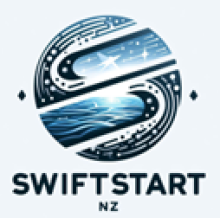 This is a fictional example to help people using Poupou Matatapu understand how to do privacy well.
This is a fictional example to help people using Poupou Matatapu understand how to do privacy well.
SwiftStart NZ is a software as a service (SaaS) company based in Christchurch that aims to provide online solutions for small and medium-sized retail businesses. The company was recently founded by three digital entrepreneurs who saw a gap in the market for affordable and easy-to-use tools for managing various aspects of business operations, such as accounting, marketing, customer service, and project management. SwiftStart NZ's mission is to help businesses grow and succeed by offering them a suite of cloud-based applications that can be accessed from any device and location.
SwiftStart NZ has a small and dynamic team of seven employees, including the three founders who act as the chief executive officer, the chief technology officer, and the chief product officer. The other four employees are two software developers, one marketing and sales manager, and one Operations Manager, who is responsible for any legal and compliance issues. They work collaboratively to create and deliver high-quality and user-friendly SaaS products for their clients.
SwiftStart NZ’s platform is still in its early stages, but they have already secured a dozen pilot clients in New Zealand who are testing and providing feedback. The company hopes to fully launch its services to the wider New Zealand market by the end of the year, and then will look to expand to international clients, particularly in Australia and America.
SwiftStart NZ directly manages personal information of its clients (account holder contact information etc.) and employees (including contracts, contact information and wage records). It is also responsible for a wide range of personal information that it holds on behalf of its clients through its cloud-based applications, including for example contact information, sales records, customer correspondence, marketing preferences, invoices and billing information.
After one of the pilot clients raised concerns about the privacy of their customer’s records, SwiftStart NZ decided to conduct a comprehensive review of its data protection policies and practices to ensure that its products comply with privacy requirements and meets best practice.
SwiftStart NZ believes that the review will enhance its reputation and credibility as a SaaS provider and create more value and satisfaction for its clients and their customers. By demonstrating its commitment to privacy and data protection, SwiftStart NZ hopes to build long-term and loyal relationships with its clients and to attract more potential customers who are looking for reliable and secure online solutions for their businesses.
While SwiftStart NZ has limited budget and resources to dedicate to privacy, its clients expect SwiftStart NZ to appropriately manage privacy risks, and failure to do so may place them in breach of contract with their clients. Given it’s a service provider with large amounts of data that it processes for its clients, and this will increase as the organisation expands, SwiftStart NZ has a medium privacy risk profile.

 This is a fictional example to help people using
This is a fictional example to help people using  This is a fictional example to help people using Poupou Matatapu understand how to do privacy well.
This is a fictional example to help people using Poupou Matatapu understand how to do privacy well. This is a fictional example to help people using Poupou Matatapu understand how to do privacy well.
This is a fictional example to help people using Poupou Matatapu understand how to do privacy well. Green Gardens is a gardening business in Aotearoa New Zealand, offering residential and commercial gardening services in Nelson. They have a website where customers can enquire about their services via their online enquiry form.
Green Gardens is a gardening business in Aotearoa New Zealand, offering residential and commercial gardening services in Nelson. They have a website where customers can enquire about their services via their online enquiry form.